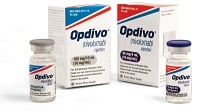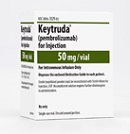 Thanks to an FDA decision over the weekend, Bristol-Myers Squibb's ($BMY) immunotherapy Opdivo has caught back up to Merck's ($MRK) Keytruda in melanoma. And it won a new combination approval from the FDA to boot.
Thanks to an FDA decision over the weekend, Bristol-Myers Squibb's ($BMY) immunotherapy Opdivo has caught back up to Merck's ($MRK) Keytruda in melanoma. And it won a new combination approval from the FDA to boot.
Last fall, the FDA handed Keytruda a lead in advanced melanoma, approving the Merck drug for previously untreated patients regardless of the genetic characteristics of their tumors. The Bristol-Myers med also won a nod for first-line use, but only in patients who tested negative for a particular mutation in the BRAF gene.
The BRAF-positive group? Try again, FDA told Bristol-Myers. Now, the agency is convinced, and Opdivo has the green light for solo use in previously untreated patients, regardless of their BRAF status.
Perhaps more importantly, BMS grabbed an expanded combination approval for Opdivo alongside Yervoy, its first melanoma immunotherapy, approved back in 2011. Like Opdivo alone, the pair was already approved for patients with advanced melanoma who'd tested negative for BRAF mutation. Now, it's cleared for appropriate patients, BRAF mutation or no.
The approvals are based on data from the Checkmate-067 trial, which compared Opdivo as a solo treatment and Opdivo plus Yervoy against Yervoy alone. Both the single drug and the combo beat Yervoy monotherapy in holding off the spread of disease in patients who hadn't been previously treated. Progression-free survival hit 11.5 months in patients who took the combo regimen and 6.9 months for those who took only Opdivo, compared with 2.9 months for Yervoy-only patients.
Side effects were more common in patients on the two-drug regimen; more of the combo-cocktail patients dropped out because of adverse reactions. Among the most common side effects were diarrhea and colitis.
The additional approvals augment Opdivo's lineup of FDA nods, which already added up to the lion's share of the immuno-oncology market, according to Leerink Partners data. BMS boasted an 84% share of the immuno-oncology market as of December, analyst Seamus Fernandez wrote in a recent note.
The two-drug regimen made its debut at $141,000 for a four-dose course of treatment, $256,000 for a full year's worth of therapy.
 Right now, Opdivo and Keytruda are the only two head-to-head competitors in immuno-oncology, each with a range of approvals in melanoma and lung cancer. The BMS drug has also posted impressive data in kidney cancer, topping Novartis' ($NVS) Afinitor in that disease last year.
Right now, Opdivo and Keytruda are the only two head-to-head competitors in immuno-oncology, each with a range of approvals in melanoma and lung cancer. The BMS drug has also posted impressive data in kidney cancer, topping Novartis' ($NVS) Afinitor in that disease last year.
But the two are expected to soon face a new rival in Roche's ($RHHBY) atezolizumab, which targets PD-L1, rather than PD-1 as the other two do. Though the Swiss drugmaker's entrant carries a $2 billion sales estimate right now, Roche thinks that PD-L1 target and its data in a broad range of cancers, plus some combination-therapy studies, could give atezolizumab a better shot than analysts realize.
- see the release from BMS
Special Reports: Top 15 pharma companies by 2014 revenue - Merck - Bristol-Myers Squibb | Top 10 best-selling cancer drugs of 2013